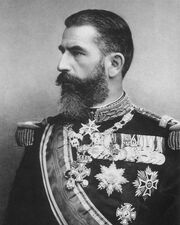(Created page with "{{Infobox war | conflict = First Linganese Civil War | partof =19th Century Linganese Unrest | image = 250px | caption = C...") Tag: Visual edit |
No edit summary Tag: Visual edit |
||
| Line 25: | Line 25: | ||
• [[Image:Lingang 1stcivilwar loyalflag tiny.png|24px]] Lingang: |
• [[Image:Lingang 1stcivilwar loyalflag tiny.png|24px]] Lingang: |
||
720,348 |
720,348 |
||
| − | | strength2 = Traditionalists: <br>≈ |
+ | | strength2 = Traditionalists: <br>≈ 698,246 |
• [[Image:Lingang national party flag off tiny.png|24px]] |
• [[Image:Lingang national party flag off tiny.png|24px]] |
||
CLG: 409,125 |
CLG: 409,125 |
||
Revision as of 06:14, 22 August 2021
The First Linganese Civil War was a civil war fought between Linganese federal armed forces and various rebelling factions, namely the Crown Land Guards (CLG) and Linganese Christian Union (LCU), the latter of which was mostly made up of the landowning elite of Lingang, over control of the government. The war was fought between 1884 and 1891, and resulted in the federal government being overthrown by the CLG and the National Party being established as the governing faction of the nation.
Overview
Lingang in the 19th century was already plagued with instability and growing dissent among the poor and working classes. With the possibility of total societal upheaval approaching, Lawford and groups like the Crown Land Guards seized on the opportunity to gain more power. In the summer of 1884, as various factions had risen up in rebellion across the nation, some organized and others simply led by angry peasants, the CLG began to organize a coup attempt. Lawford was chosen as the new leader of the CLG and was declared by the group to be the rightful President. In response, the Grand Congress impeached Lawford and removed him from office. He was later charged with treason. However, the perceived legitimacy of the Grand Congress, and of President Orwell himself, had been greatly compromised due to many defections within the ruling political apparatus. Many prominent and powerful figures in the country no longer recognized President Orwell’s regime as legitimate, and sided with whatever faction they had more interests in (most joined had joined the CLG). Lawford was briefly imprisoned, but was freed in what came to be known as the Storming of Strautenburg, when CLG/Lawford loyalists attacked the capitol and attempted to siege the Grand Congress Palace. They initially came short of these ambitions, but the movement was far from dead. The army itself was divided between Orwell Loyalists and those wanting to see the CLG and Lawford take control of the nation. Thus, the First Civil War had begun.

Vincent S. Lawford's official portrait after being inaugurated as the first Supreme Lord of Lingang.
The war would last for seven years and ultimately resulted in a victory for the CLG. On 14 February, 1891, former President Orwell was stripped of his remaining powers and temporarily imprisoned. There were originally plans made to execute him publicly, however Lawford allowed him to flee the nation in exile as a show of mercy. Lawford was declared to be the Supreme Lord of Lingang on 15 April, 1891, a very powerful position that replaced the presidency. The CLG set to work in making itself the dominant ruling force of Lingang. The former ruling faction, Orwell’s own Union Party, was outlawed and forcibly disbanded. The CLG declared itself to be the one and only political party of the nation, and merged with the Linganese Christian Union (LCU) to become the National Party of Lingang. The merger with the LCU was in part an attempt to placate the masses by convincing them of the party’s righteous morality and Christian nature. The National Party initially focused on consolidating its power and position in society, as well as focusing on pro-business and religious themes.

